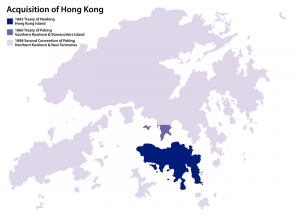Week 11: Awaiting China
I. The Growth Years
- GDP (1960s: 10% growth per annum; 1970s–1980s: 500%)
- Social welfare (1970–71: HKD 40 million; 1986–87: 2.5 billion)
- Hong Kong Stock Exchange (1914; 1986) . . . The Greed of Man (1992)
- Li Ka-shing 李嘉誠 (b. 1928; Hutchison-Whampoa, 1980; Hongkong Electric Holdings, 1985; real estates; 43% of Husky Energy, 1986; 1986 Expo site [Vancouver], 1988; Panama Canal ports)
II. Post-Mao China
- UN membership (Nov 1971)
- Gang of Four
- Deng Xiaoping 鄧小平 (1904–97)
- Open-door Policy (1978; Shenzhen Special Economic Zone, 1980)
- Removal from list of colonies (1972) — “Crown Colony” to “Dependent Territory”
- The MacLehose visit (1979)
- British Nationality (Hong Kong) Act (1981)
- The Margaret Thatcher visit (1982)
- The Basic Law (1990) . . . Drafting Committee (59/23) . . . Consultative Committee
VI. “Through-Train” Derailed
- Political Reforms . . . District Administration Scheme (1982) . . . Legislative Council (1988, 1991 [16/18])
- The Chris Patten Years (1992–1997) . . . Electoral Reform of 1994 (20 directly-elected seats from geographical constituencies, 30 functional constituencies, and 10 seats by an election committee) . . . Provisional Legislative Council (1996)
VII. The Transition Period
- GDP (mid-1990s: service sector ~85%; manufacturing <10%)
- About 10% or 600,000 emigrants (50%+ to Canada) between 1984 and 1996 . . . 44,169 (1995 peak)
- Consider the reflections in Hong Kong Remembers, how would you account for the diverse sentiments shared among the people of Hong Kong on the eve of the handover?
- The Basic Law was in many ways a product of compromises. Given what you have read, could you identify such compromises? Again, based on what you have read, what are some of the sources of tensions we are witnessing nowadays?
External Links to Images:
Language Campaign
Top

